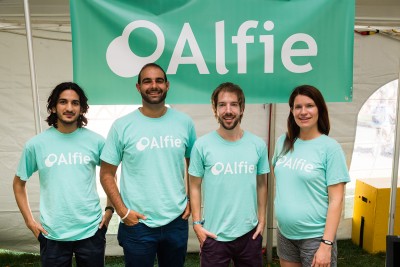
Despite the efforts of universities and the government to provide financial aid and student loans, student debt remains a growing national crisis. Alfie, the Alternative Finance in Education, a startup based at the Massachusetts Institute of Technology, looks to reduce the weight of this problem.
Alfie is one of the 17 startups that participated in this summer’s Delta V startup accelerator program at MIT. American student debt has grown to almost $1.3 trillion, according to Student Loan Hero, Inc. Alfie provides a more flexible way to finance students’ education, investing in students for a fixed share of their income over a fixed period of time, according to its website.
Their work is inspired by statistics. Pepijn van Kesteren, the CEO and founder of Alfie, said the individual student’s median debt has almost increased by threefold in the past 25 years. The median income post-graduation for these same students, he said, has grown by less than 2 percent.
“More than ever does this put pressure on the student to choose a career [to pay off] student debt, instead of a career that they are passionate about,” van Kesteren said. “This is bad for not only the student himself, but also for society. We wanted to break through that.”
According to its website, Alfie uses a concept called Income Share Agreement. This provides the opportunity for students to pay a fixed percentage of their income over a fixed period of time, so that, Alfie reasons, they will never have to worry about having to choose a lucrative and practical career immediately after graduation.
“It’s all about the mission, it’s all about offering students the opportunity to pursue their passion. That is something I find absolutely great,” said Pierre-Jean Hanard, a Sloan Fellow from MIT who is one of Pepijn’s mentors. “There is always the reality of the financial commitment that they face from the different loans that they took to go to this school.”
This more fluid, career-based loan system is pointed toward students who don’t have an established career just yet.
“That way your payments will never be more than you can afford,” the website states.
The startup’s definition of the fixed income percentage and time period is based off of its calculations of an individual’s likely income profile. Using data analysis and algorithm, Alfie finds an individual’s projected income profile. Depending on how high or low this projection is, students will pay an according income percentage after graduation.
“[There are markers] in someone’s past allows us to predict their likely income profile,” van Kesteren said. “We’re not looking for things like SAT and GPA, because they’re actually not very predictive of income profile. It’s about measurable behavioral characteristics, and elements of that, for example, are program are you choosing and your career before you went to school.”
Van Kesteren said he hopes Alfie will give students complete control over what career they want to pursue. Despite the algorithms, Alfie will exert no influence over the future that students choose.
“Your career choice is completely your choice,” van Kesteren said. “We don’t want to have any impact. We don’t want investors to be directly linked with students and … tell them to do something else because they want their money back.”
However, if students run into obstacles that prevent them from paying back their tuition, Alfie aims to provide assistance with more than a check.
“Unlike with debt, what happens is you don’t have a job and stop paying the debt, people will call you and say, ‘Hey, you need to pay me back,’” van Kesteren said. “With us, we’ll call you and say, ‘Hey, we see that you’ve lost your job. Let’s find a way to help you find a job again.’”
Van Kesteren came up with the idea 11 years ago, when he was an exchange student from the Netherlands studying at University of Florida.
“As an exchange student, I didn’t have to pay for the tuition costs … but I did see the receipts of the cost of attendance,” van Kesteren said. “At the time, they were about $18,000 per semester … and in the Netherlands I paid 1,200 Euros a year. It made me realize that for a lot of people, particularly in the U.S., where there’s a big income inequality, it’s really not [practical] to attend college if it is that expensive.”
Van Kesteren said Alfie plans to work more closely with universities and solidify the capital that they will be providing to finance students’ education.
“Alfie’s mission is so important for everybody,” said Nick Meyer, an entrepreneur in residence at the Marin Trust Center for MIT Entrepreneurship. “In a more developed country like the states, there are less obvious problems that are holding our country hostage. Student debt is a big one.”
Van Kesteren said he ultimately hopes that Alfie will fuel future innovation.
“If we can unlock the human potential that is being blocked by the limitations of student debt,” he said, “I want to solve that problem, because I want to see what we can achieve as a society.”


























































































































